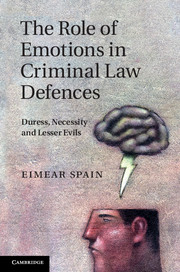4 - Elements of the defences
Published online by Cambridge University Press: 07 October 2011
Summary
The development of the defences of duress and necessity in the courts over many centuries has resulted in some undesirable consequences, including the growth of the defences, and the conditions attaching to them, in a way which has not always been consistent with their stated rationales. The importance of consistency and coherence between the defences as a whole and their established rationales should not be underestimated and this chapter analyses the principal elements of the defences in light of both their existing rationales and those proposed in this book. Running through this discussion of the modern case law is a consideration of the varying theories of duress. The Aristolean view of duress, as a factor affecting the voluntariness of an act and overbearing the will of the defendant, dominates the common law system today. A pure utilitarian, retributivist or denunciatory theory may also be employed to justify the existence of the duress defence. However, the theory of duress favoured here is a moralised account of the defence, focusing on the deserts of the offender. So, this chapter is prescriptive, setting out the elements of the defences, but it also puts forward a more conceptually coherent rationale for the defences focused on normative judgments that is reflective of the modern understanding of emotions and the interaction of law and morality.
Despite being typically viewed as a purely utilitarian defence, the necessity defence has been described in Aristolean terms, focusing not on the greater good, but the difficult situation in which the defendant finds himself and the resulting constraint on his choices. It is submitted that there is still a case to be made for a pure utilitarian defence of ‘lesser evils’ focusing on the minimisation of harm and the analysis of the elements of the defences and case law which follows aims to illustrate this and show just where such a defence would be accommodated within legal theory. Of course any discussion of this nature necessarily involves a reflection on the basis of the defence and some consideration will be given to this aspect of the defences.
- Type
- Chapter
- Information
- The Role of Emotions in Criminal Law DefencesDuress, Necessity and Lesser Evils, pp. 149 - 209Publisher: Cambridge University PressPrint publication year: 2011



